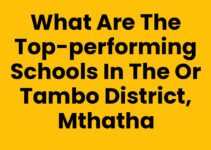Mthatha, once known as Umtata, is a town in the Eastern Cape province of South Africa that is rich in cultural heritage and history. As the birthplace of former President Nelson Mandela, it holds significant political symbolism. However, beyond its historical context, the political climate in Mthatha is shaped by various socio-economic challenges, governance issues, and local community engagements. In this blog post, we will delve deeply into the political climate of Mthatha, exploring its key elements, recent developments, and implications for the community.
What Is The Political Climate Like In Mthatha?
The political climate in Mthatha is multifaceted, characterized by a blend of power struggles, community activism, and ongoing challenges related to governance and service delivery. A crucial aspect of the climate is the dominance of the African National Congress (ANC), which has been the ruling party in the region since the end of apartheid. However, recent elections have seen a notable rise in opposition parties, prompting a shift in dialogue and political engagement among residents.
One of the pressing issues affecting Mthatha’s political landscape is the problem of service delivery. Residents frequently express discontent over water shortages, electricity supply, and inadequate healthcare facilities. The local government has made efforts to address these concerns, yet many citizens remain skeptical about the effectiveness of these initiatives. This ongoing frustration has led to increased community mobilization, with organized protests and petitions becoming common methods for residents to voice their demands.
In addition to local governance issues, the town’s political atmosphere is influenced by broader national dynamics. Economic policies, job creation, and land reform are central themes within South African politics, with Mthatha being no exception. The local political discourse often reflects the national conversation, particularly in relation to the economic empowerment of previously disadvantaged communities. As such, discussions about development opportunities and the empowerment of local businesses are essential components of Mthatha’s political climate.
Another significant aspect to consider is the role of political leadership in Mthatha. The current mayor and local councilors have been under scrutiny regarding their decision-making processes and accountability to constituents. Transparency in governance remains a critical area of interest for the citizens of Mthatha, prompting civil society groups to advocate for greater engagement between the local government and its residents.
Check This: Discover the Best Gym In Mthatha for Your Fitness Journey
Key Players in Mthatha’s Political Landscape
The political landscape of Mthatha is shaped by multiple stakeholders, including local government officials, community organizations, and political parties. The ANC continues to hold a majority, but opposition parties such as the Economic Freedom Fighters (EFF) and the Democratic Alliance (DA) are increasingly making their presence felt through campaigns and grassroots engagement.
Local activists and community leaders also play a vital role in shaping the political climate. Many have established non-governmental organizations focused on social justice, environmental matters, and economic empowerment. Their initiatives often aim to bridge the gap between the government and residents, fostering dialogue and collaboration essential for sustainable development.
Educational institutions, notably the Walter Sisulu University, contribute to the political climate by nurturing young leaders and creating an informed citizenry. Many students engage in political discourse through various platforms, promoting critical awareness of local and national issues.
Related Guide: Houses To Rent In Mthatha Cbd: Your Ultimate Guide
The Future of Mthatha’s Political Scene
Looking ahead, Mthatha’s political climate is expected to evolve as more residents become involved in civic engagement. With the increasing use of social media as a tool for mobilization, local citizens are likely to utilize digital platforms to raise awareness and push for accountability from their leaders. Moreover, upcoming elections will serve as a crucial period for strengthening democracy in the region.
Engagement from young voters will likely influence the political narrative, as their priorities are often distinct, focusing heavily on employment opportunities, education, and climate issues. Political parties that can effectively connect with these issues stand to gain support from a younger demographic.
In conclusion, the political climate in Mthatha is characterized by complexity and change. While historical legacies shape its present, the ongoing dialogue around governance, service delivery, and community empowerment continues to define its future. As residents become more engaged, the political landscape will likely see further transformation, fostering an environment ripe for growth and development.
See Also: Wsu Mthatha Accommodation Application: A Complete Guide
Frequently Asked Questions
What are the main political challenges in Mthatha?
Key challenges include service delivery issues, political accountability, and economic empowerment for residents.
How does the ANC influence Mthatha's governance?
As the ruling party, the ANC shapes local policies and governance, though it faces increasing pressure from opposition parties.
What role do community organizations play in Mthatha?
Community organizations advocate for residents' rights, promote transparency, and address local issues through mobilization efforts.









